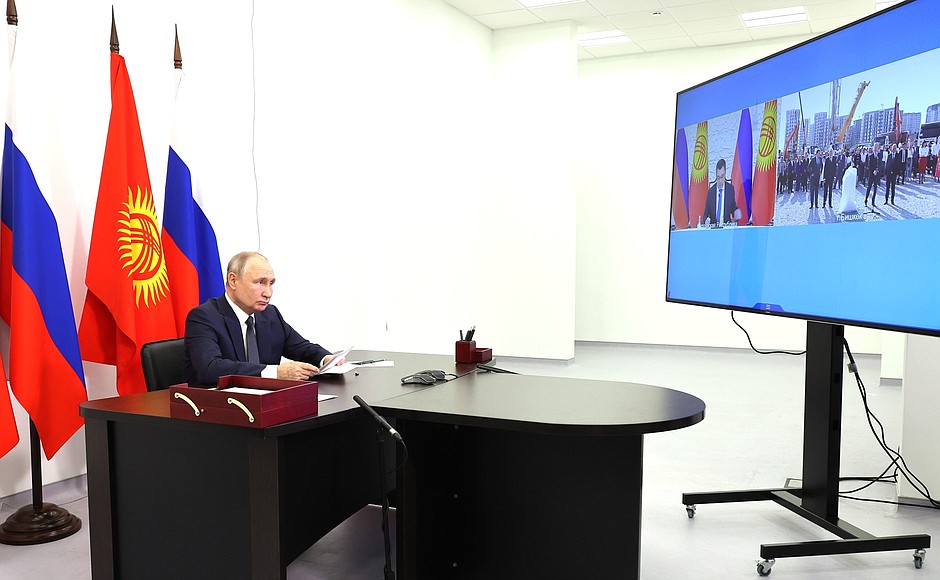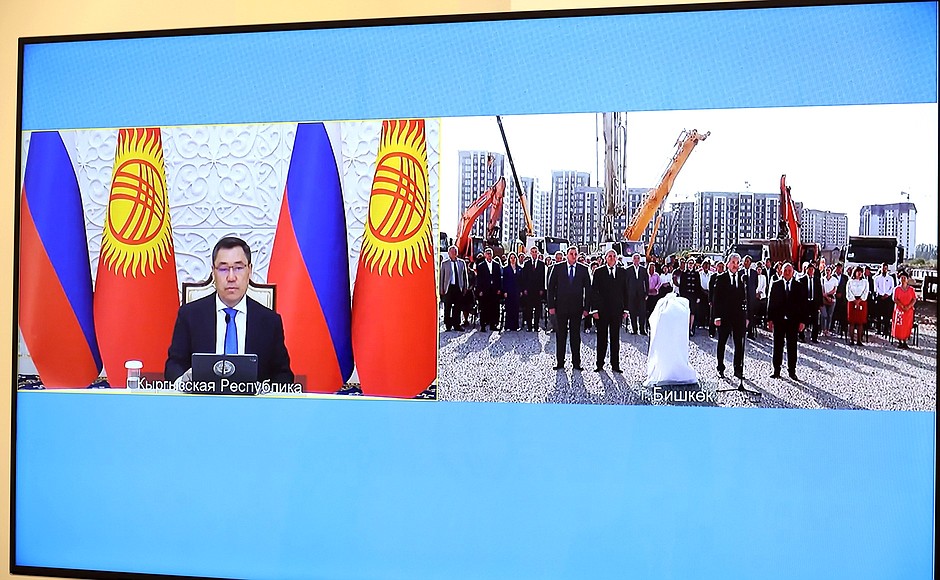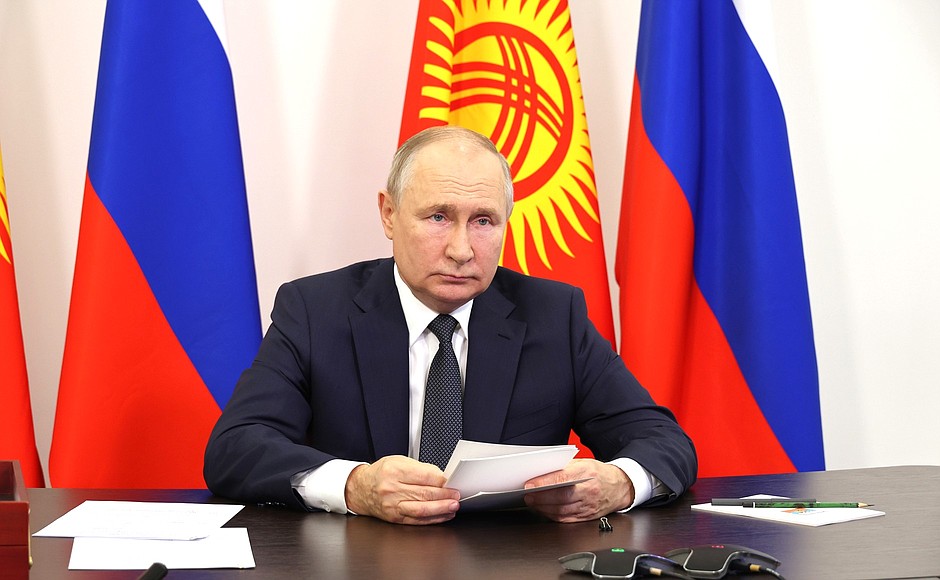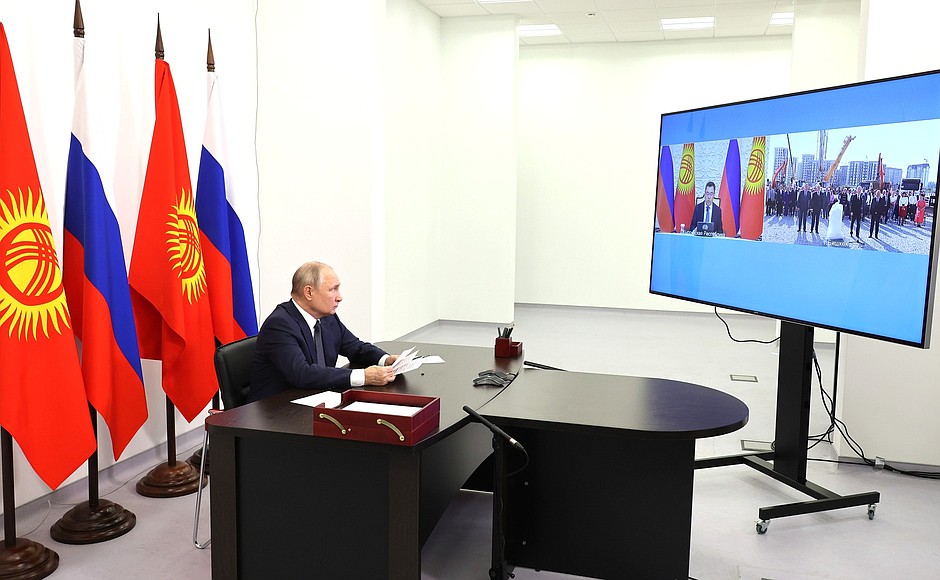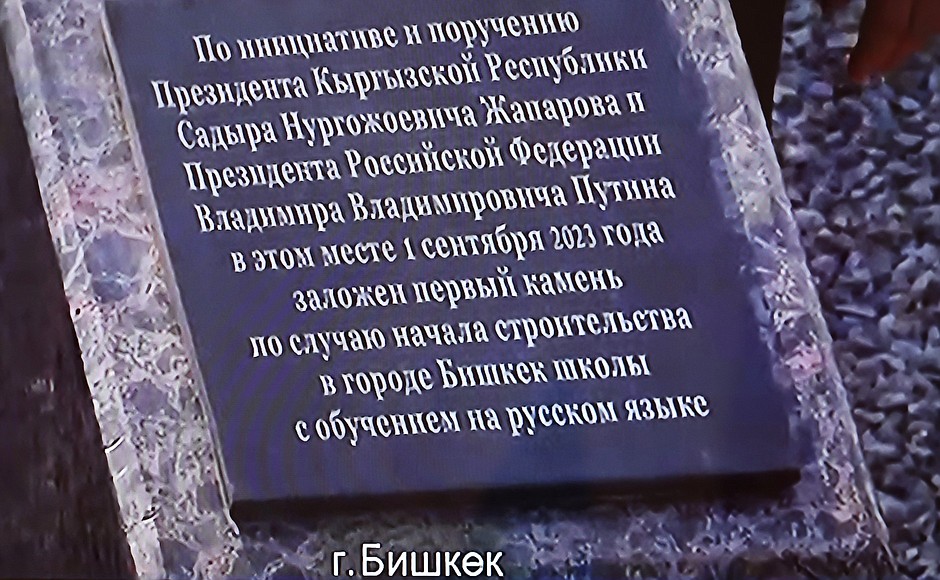President of Russia Vladimir Putin: Mr President, friends,
I join my colleague and friend, President Japarov, in congratulating all of you on breaking ground for three new Russian-Kyrgyz schools in Kyrgyzstan with instruction in Russian.
It is symbolic that we are launching this important and highly relevant project on September 1, Knowledge Day, which traditionally marks the beginning of the new academic year, both in Russia and Kyrgyzstan. I would like to take this opportunity to wish all the best to Kyrgyzstani as well as Russian schoolchildren, university students, teachers and educators on this holiday.
In a minute, the cornerstones will be laid in the foundations of the schools in Bishkek, Batken and Karakol. I am sure that the builders will work efficiently and quickly so that in 2026, pupils will be sitting at their new desks. Russia plans to build nine schools in seven cities and two villages in the republic by 2027, to serve over 11,000 children.
The new educational institutions will be equipped with the most advanced technologies. This will help make the teaching and learning process comfortable, interesting and exciting. The school buildings have been designed to meet the highest safety standards, including those specific to Kyrgyzstan – I am referring to seismic risks.
Russia will fund the construction and equipping of the schools, including the sports infrastructure that President Japarov just mentioned, swimming pools, and textbooks.
Teaching at schools will be carried out simultaneously according to Russian and Kyrgyz educational standards. I think this is very important because graduates will receive two diplomas, a Russian and Kyrgyz one. Everyone knows that this indeed is a significant competitive advantage in the further professional path.
Both Russian and Kyrgyz teachers who have undergone special training at Russian universities will work at schools, which will make it possible to combine and integrate the teaching, mentoring and educational potential of our countries, as well as to ensure a high quality of education at the future joint schools.
I know that there are 251 schools in Kyrgyzstan with tuition in Russian, and in another 416, pupils study Russian along with Kyrgyz and other languages. Russian teachers provide methodological assistance to those schools.
In particular, the Russian Teacher Abroad project has been successfully implemented in Kyrgyzstan since 2019. In the new academic year, about 120 teachers from Russia will teach Russian language and literature, physics, mathematics, chemistry, biology and computer science in 51 Kyrgyz schools.
Let me remind you of another Russian humanitarian project called The Power of the Mind. Under this project, schoolchildren from friendly countries – including, of course, Kyrgyzstan, which is our strategic partner – can take advantage of physics and mathematics courses taught in Russian. This project started in 2022 and has attracted a lot of attention since, so it was decided to increase enrolment for these extracurricular physics and mathematics programmes. This September, almost 700 pupils at secondary schools in Kyrgyzstan will start the programme.
Our countries are actively conducting student exchanges. It is common for Kyrgyz schoolchildren to be invited to Russia for a three-month period to study Russian language, history, culture and other subjects.
Moreover, Russia and Kyrgyzstan are fruitfully cooperating in higher education, as the President of Kyrgyzstan has just said. Currently, over 16,000 university students from Kyrgyzstan are studying in Russia, including 7,000 with the Russian government’s grants. The government quota for Kyrgyzstan in the 2023/24 academic year will be 1,000 places with such grants.
Kyrgyz-Russian Slavic University with a student body of over 7,000 is also involved in educating professionals. In October of this year, the university will celebrate its 30th anniversary. The network of Russian university branches is also expanding in Kyrgyzstan, as has been mentioned. For example, I can confirm that Moscow State University is planning to open a branch of its own.
Let me stress that all these diverse education projects have become possible largely thanks to President Sadyr Japarov’s support and personal involvement. President Japarov is doing much to preserve the position of the Russian language in Kyrgyzstan. In general, I want to say that Kyrgyzstan pays much attention to this matter. Russian is a state language, and this unique state of affairs is evidence that Kyrgyzstan attaches high importance to promoting our relations.
I remember President Japarov say during our meeting in February 2021 that it is necessary to build Russian schools almost in every district centre of Kyrgyzstan. We will certainly support this. Due to our joint efforts, this work is making good headway.
I am confident that the new Russian schools will contribute to the comprehensive education and training of Kyrgyzstan’s rising generations, thereby promoting the traditions of friendship and mutual understanding between our two nations as well as the further development of the truly strategic partnership of Russia and Kyrgyzstan.
Friends,
Yesterday, as we all know, the Kyrgyz Republic marked its Independence Day. We and I personally congratulated Kyrgyzstan and its President on this holiday. But today, I would like once again to sincerely congratulate President Japarov, all our Kyrgyz colleagues, and the whole of the friendly Kyrgyz nation on this holiday. I wish all of you happiness, wellbeing, and every success in all your undertakings.
I believe that our cooperation in education will facilitate this.
Thank you for your attention.
